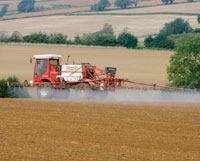Beware sulfonylurea herbicide sequence consequence

New approvals have shaken up the grassweed herbicide market. Mike Abram reports
A relaxing of the rules surrounding the use of sulfonylurea grassweed herbicides this autumn, plus a new product on the market, should bring greater flexibility and choice for growers with blackgrass and other grassweed problems.
But a careful eye on what sequences of sulfonylureas herbicides are permitted – and consideration of what early season product choice might mean for later weed control strategies – will be needed.
The relaxation of the rule that prevented two grassweed active sulfonylurea herbicides from being used in a wheat crop has opened up some new opportunities. But only specific sequences or products are allowed.
The key change is that Lexus, applied before any blackgrass emergence, can now be followed by Atlantis or any other member of the mesosulfuron family of products. Previously, that sequence had been ruled out by the Chemicals Regulation Directorate on the grounds that it could increase the chance of resistance building against sulfonylureas herbicides.
But an independent study has confirmed that that sequence posed no greater risk of resistance development than the use of a iodosulfuron + mesosulfuron product alone.
Enhanced metabolic blackgrass resistance is believed to be linked to enzyme levels in the plant that break the herbicide down, explains DuPont‘s Alister McRobbie.
Germinating plants are less able to metabolise flupyrsulfuron than established seedlings, which is why it has a greater effect on resistant blackgrass as a pre-emergence product when it is taken up through the root than as a foliar application, he says.
The sequence’s approval will likely mean Lexus becomes a realistic option as part of a pre-emergence “stack” for the control of blackgrass. In DuPont trials adding Lexus to five commonly used pre-emergence products or mixes has improved blackgrass control by 10-30% depending on product.
But be aware that after applying this sequence, no other ALS-inhibiting herbicide can be applied in that season, warns Mark Hemmant, technical manager for Agrovista.
That could have implications where growers are also using an early season cleavers control product, such as Boxer, Chekker, Starane XL or Spitfire. “Mixing one of those with a spring-applied Atlantis has grown in popularity in recent years. A Lexus / Atlantis sequence would rule that out.”
Similarly, any late season control of volunteer potatoes, thistles or late-germinating polygonum weeds with a metsulfuron or similar broadleaved weed sulfonylurea herbicide will not be permitted after the sequence.
Following Lexus pre-emergence with one of the Broadway family of products from Dow AgroSciences will also not be permitted. But Dow does have GF-2070 – a mix of pyroxsulam + flupyrsulfuron – approved for use this autumn.
Its approval looks to have come once the Lexus sequence opened the door for more than one grassweed-active sulfonyurea product to be applied against blackgrass.
But Mr Hemmant reckons that its place is more likely to be where other grassweeds are more of a problem with a background population of blackgrass than where blackgrass dominates.
“In out-and-out blackgrass trials it hasn’t been as robust as Atlantis,” Mr Hemmant says. “It hasn’t performed as consistently so I don’t think it will replace Atlantis in the bigger blackgrass areas.”
But it will have a place in northern and western areas where ryegrass or brome are the main threats and good incidental control of blackgrass is required, he reckons.
Bob Mills, technical manager for Frontier Agriculture agrees. “If you have ‘girly’ blackgrass and had other grassweeds then GF-2070 would be a good choice. If you’ve got mega-resistant blackgrass, where Atlantis has struggled in the past, I’m not sure you will have any greater success with GF-2070.”
It has to be used with a robust pre-emergence treatment, but it does, like the Broadway products, have a good broadleaved weed spectrum and much fewer restrictions on following crops and cultivations than Atlantis.
The latter should, perhaps, be considered more by growers, he adds. “If you don’t plough after Atlantis and establish oilseed rape, you’re not committing an illegal act, but there are risks associated with it.
“I’ve got no data to support it, but where oilseed rape germination isn’t as good as it might be, it could be due to sulfonyurea residues. In particular, growers establishing oilseed rape by a no-till method have to consider more carefully what they have done previously.”

